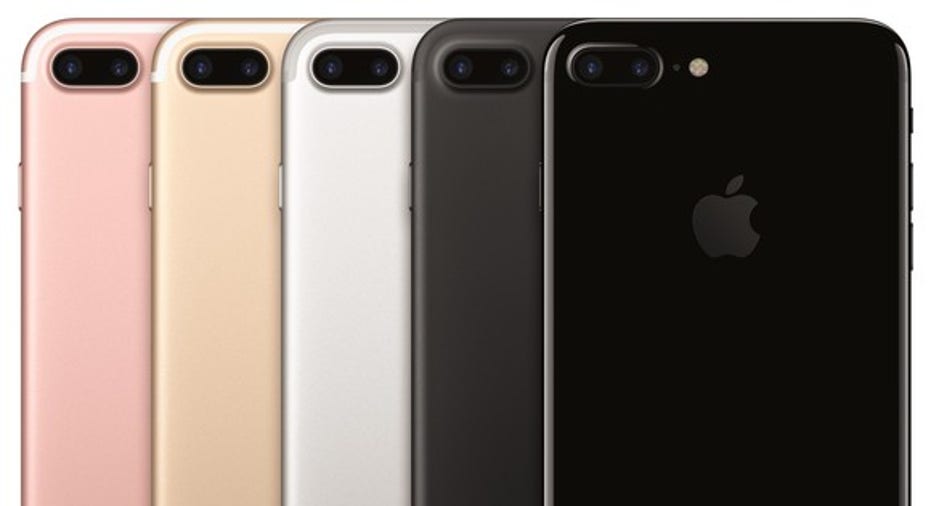Apple Inc.'s Jet Black iPhone Is Ridiculously Hard to Make

Image source: Apple.
Anybody who has tried to buy one of Apple's (NASDAQ: AAPL) new iPhone 7 or iPhone 7 Plus smartphones has probably noticed that it's tough to get ahold of these phones in Apple's new Jet Black finish.
It's clear that demand for phones, particularly the larger iPhone 7 Plus, is quite robust. However, the apparently unexpected level of demand for this finish isn't the only major driver of the huge supply/demand balance that currently exists.
Per respected KGI Securities analyst Ming-Chi Kuo, this Jet Black finish is also exceedingly difficult to manufacture right now.
How low are manufacturing yields right now?
Kuo says (via MacRumors) that the manufacturing yields for the Jet Black iPhone 7/7 Plus are currently in the 60%-70% range. What this means is that for every 100 Jet Black casings that Apple and its manufacturing partners attempt to produce, 30%-40% are unusable.
Allow me to explain why, at least from a financial perspective, such low yields can be extremely problematic for Apple.
The first, and perhaps most obvious, impact of low manufacturing yields is that Apple simply won't be able to build as many phones as it had hoped to. This means Apple can't meet demand as quickly as it would like to, which frustrates potential buyers.
The next impact is to gross margins/profitability. There are costs associated with the manufacture of these iPhone casings (both raw material costs and depreciation), so when Apple is forced to not use an iPhone casing that comes off the line, it has to incur the manufacturing cost of that casing without seeing the associated revenue that should have come from selling the device, hurting profitability.
Why can't Apple just put in more capacity to meet demand?
It might seem like a good idea for Apple to simply put in more manufacturing capacity for the Jet Black iPhones to offset the lower manufacturing yields.
There are a couple of problems with that.
First of all, a company can't simply snap its fingers and have manufacturing capacity put in the next day. Building out additional capacity takes time.
However, perhaps a stronger argument against such "overprovisioning" to compensate for yields is that over time, manufacturing yields will improve, and demand for these phones will inevitably decline.
This means if Apple puts in too much capacity to try to compensate for early yield issues, eventually, the company and its manufacturing partners will find themselves with too much iPhone manufacturing capacity installed.
Having too much capacity, from a financial perspective, means Apple still incurs the depreciation expense associated with the additional production equipment, but that equipment isn't productive. This would ultimately hurt Apple's gross profit margins and, thus, overall profitability -- much to the chagrin of Apple stockholders.
Manufacturing is tricky business
At the end of the day, manufacturing expensive, complex devices at the scale Apple does is extremely difficult. There are negative consequences to having too much capacity in place, and at the same time, there are real issues involved with not putting in enough capacity (or putting in "enough" capacity, but then yield issues bring down a company's effective output).
Potential buyers looking to get their hands on the Jet Black iPhone will just need to wait for demand to die down and/or for Apple to improve its manufacturing yields on those models. This is a bummer, but investors should at least rest assured that the iDevice maker is doing its best to maximize long-term shareholder value.
A secret billion-dollar stock opportunity The world's biggest tech company forgot to show you something, but a few Wall Street analysts and the Fool didn't miss a beat: There's a small company that's powering their brand-new gadgets and the coming revolution in technology. And we think its stock price has nearly unlimited room to run for early, in-the-know investors! To be one of them, just click here.
Ashraf Eassa has no position in any stocks mentioned. The Motley Fool owns shares of and recommends Apple. The Motley Fool has the following options: long January 2018 $90 calls on Apple and short January 2018 $95 calls on Apple. Try any of our Foolish newsletter services free for 30 days. We Fools may not all hold the same opinions, but we all believe that considering a diverse range of insights makes us better investors. The Motley Fool has a disclosure policy.



















